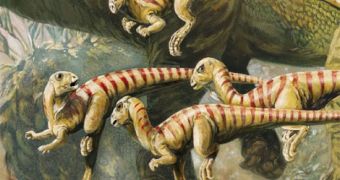A study published only yesterday in the scientific journal PLOS ONE says that juvenile dinosaurs born roughly 75 million years ago had to always be on the lookout, seeing how certain crocodyliforms they shared their natural habitat with were quite keen on turning them into their next meal.
Up until now, most such studies concerning the rivalry between these two species of reptiles focused on how large crocodile-like creatures and adult dinosaurs interacted with one another.
In other words, the main focus was on trying to figure out whether or not ancient crocs fed on giant, grown-up dinosaurs.
However, new evidence suggests that juvenile dinosaurs also ran the risk of being eaten by a small crocodyliform, Live Science informs us.
While analyzing fossils collected from various parts of the Grand Staircase-Escalante National Monument in southern Utah, the scientists who embarked on this research project came across several dinosaur remains dating back to 75 million years ago.
By the looks of it, these fossils came from a species of herbivorous dinosaurs, and some of them displayed bite marks which were proof enough that the animals had at one point been attacked by an animal fairly similar to modern day crocodiles.
Interestingly enough, the researchers even managed to retrieve a conical tooth which was stuck inside what used to be the thighbone of one such juvenile dinosaur and whose width was one of just 2.5 millimeters, suggesting that the animal which attacked the young reptile was by no means a large one.
“I was very surprised to find such clear feeding traces on such small bones. It shows the importance of carefully evaluating all the fossils collected from an area, and not assuming that some fossils won't be important just because they are very small or not completely preserved,” argued researcher Clint Boyd.
“Usually people tend to focus on the dangers that big, adult dinosaurs were having to deal with, but this study shows that even though dinosaurs were the dominant animals during the Cretaceous, they still had to worry about predators as soon as they were born,” Clint Boyd went on to explain.

 14 DAY TRIAL //
14 DAY TRIAL //